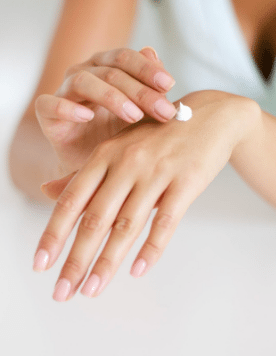There is an increasing number of women who self-diagnose their skin as sensitive. Reasons why some people have sensitive skin usually have something to do with genetics, allergies, dry skin or extreme exposure to the wind, sun or chemicals. One of the main reasons why skin becomes sensitive is the aging process since, to put it simply, skin becomes drier each decade after our roaring twenties. However, another reason for developing sensitive skin is excessive applying of multiple anti-aging products. Whatever the reason may be, there are ways to improve your skin resilience by making simple changes in your beauty routine.
Clean your skin as gently as possible

Image source: https://pixabay.com/en/green-smoothie-spinach-lifestyle-456839/
When washing your face, make sure to avoid soaps or other cleansers that contain alcohol, sulfates, and preservatives. Aside from heavily dried skin, these elements may cause a reaction like redness and tight skin along with the forming new wrinkles. Instead of using these harmful ingredients, look for more gentle and natural alternatives that will calm and soothe your skin, like herbal cleansers. Experiment with your homemade cleaning products, like cucumber juice, honey or coconut milk.
Restore balance
Every cleaning dries the skin, so after washing your face, restore the balance by moisturizing it. Sensitive skin requires not only regular moisture, but it also needs some soothing ingredients that will calm and protect the skin, so try out some natural oil formulas. Look for care products that contain natural ingredients like chamomile, jojoba or aloe vera. Oil formulas for sensitive skin are gentle and nourishing, so they will keep your skin hydrated, while it will provide many natural antioxidants that will improve and protect your skin.
Be careful when choosing skin care products

Image source: https://www.flickr.com/photos/76588981@N02/11179260694
Having sensitive skin doesn’t mean you have to say goodbye to makeup or anti-aging products, just be extra cautious. Read the labels and avoid anything that contains formaldehyde or parabens. Look for products that have vitamins C and E, as well as products with glycerin or hyaluronic acid. Also, products rich in collagen are recommendable for aging skin, although for sensitive skin best option is to use protein-rich natural marine collagen. This collagen, extracted from the saltwater fish, is highly effective and what is more important, it is a good choice for people with dry skin since it is a great moisturizer.
Try not to touch your face as often
Our hands tend to host dirt and bacteria, so do your best to concentrate on reducing hands-face contact. Also, change the pillowcase more often and make sure to get rid of the old skin care products. If you use a washcloth, replace it with a new one every once in a while and do not use the same towel for too long. Throw away old makeup and clean the makeup brushes regularly.
Test everything

Image source: https://www.pexels.com/photo/applying-body-lotion-care-cosmetic-product-286951/
Before buying a new skin care product, make sure to test it before applying to your face. Rub the small amount on your wrist, inner forearm or behind the ear and see if there is a reaction. An allergic reaction may occur instantly or even two weeks later. Nevertheless, test everything.
In conclusion
Although having sensitive skin makes you feel like almost everything is an irritating threat, few simple lifestyle changes can make it bearable. From avoiding long hot showers and dry by tapping instead of rubbing, to using fragrance-free cosmetics and hypoallergenic skin care. Choosing organic products for cleaning or organic skin care can bring significant improvements too. If treating your sensitive skin at home doesn’t work, do not hesitate to make an appointment with your dermatologist.






